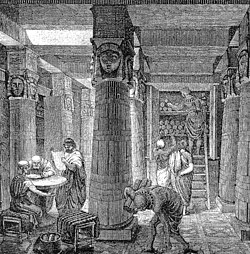Emilio (User:emijrp) has been a Wikipedia editor since August 2005, and is a bot programmer and a cataloger of human knowledge. This opinion essay is adapted from his essay Wikipedia:There is a deadline (whose title makes reference to the well-known older essay Wikipedia:There is no deadline).
The views expressed are those of the author only. Responses and critical commentary are invited in the comments section. The Signpost welcomes proposals for op-eds. If you have one in mind, please leave a message at the opinion desk.


Every day, distinct stores of knowledge are lost forever with no copies extant. When a natural disaster hits a region or a war breaks out, many libraries, archives, museums, monuments and other heritage, valuable buildings, incunabula and unique objects are destroyed.
There are plenty of examples of this from before Wikipedia's existence. The Library of Alexandria, the lost Chinese encyclopedias, churches, monasteries, convents and libraries destroyed during the Spanish Civil War,[1] a storage vault fire in 1937 that destroyed all the original negatives of Fox Pictures' pre-1935 movies,[2] hundreds of libraries and archives bombed and burnt during World War II,[3][4] more than 6,000 Tibetan monasteries destroyed during the Cultural Revolution along with unique statues, tapestries and manuscripts,[5] the National and University Library of Bosnia and Herzegovina shelled and burnt to the ground along with thousands of irreplaceable texts,[6] to name only a few.
Since Wikipedia's inception, the destruction of knowledge has been at least as bad as before. The Iraq National Library and other repositories of culture were looted and burnt during the 2003 Iraq invasion,[7] the 2004 Indian Ocean earthquake damaged or utterly destroyed libraries and archives in several countries, much of Haiti's heritage was damaged or destroyed in the 2010 Haiti earthquake,[8] just as with Chilean heritage during the 2010 Chile earthquake. Recently, the Egyptian Museum was looted during the 2011 Egyptian revolution.[9] But it does not always take a war or a natural catastrophe to endanger knowledge, as illustrated by the Duchess Anna Amalia Library fire in 2004,[10] or the collapse of the building hosting the Archive of the City of Cologne in 2009.[11]
These events usually remove pieces of human knowledge and sometimes entire cultures. Today, many of the world's languages are in danger.
Furthermore, hundreds of websites are closed every day on the Internet; the average life of a web page is only 77 days.[12] Those websites are used in many cases as references, but while projects such as the Internet Archive or WebCitation and volunteer groups like Archive Team[13] save copies of some of them, many others are lost forever.
Wikipedia and its sister projects can and must save all these forms of knowledge, through creating articles, uploading images to Wikimedia Commons, preserving languages in Wiktionary and transcribing books into Wikisource. Events like Wiki Loves Monuments may help to immortalize monuments around the world before they are damaged or destroyed, but the 2011 edition only covers European countries.[14]
There is a deadline. This is a battle against time.


Discuss this story
An interesting feature of WP:V, which is really only explained in the additional WP:Published page is that once the last known copy of some work disappears, it can no longer be cited in Wikipedia. The boundaries are even more obscure when it comes to other type of items that must be considered publicly accessible to be verifiable. Uʔ (talk) 10:34, 26 October 2011 (UTC)[reply]
Interesting opinion, but what's the frog doing there? It's extinct, and a wikipedia article won't bring it back. Choyoołʼįįhí:Seb az86556 > haneʼ 11:03, 26 October 2011 (UTC)[reply]
November @ Wikisource: is validation month. Rather than the usual project of undertaking to transcribe a work, it is the month where the focus is on progressing works that have proofread once, to proofread twice or more. Always open for new participants! — billinghurst sDrewth 11:24, 26 October 2011 (UTC)[reply]
People interested on this topic can read more here Lost Memory - Libraries and archives destroyed in the twentieth century (Archived August 30, 2011, at WebCite). Regards. emijrp (talk) 11:16, 28 October 2011 (UTC)[reply]